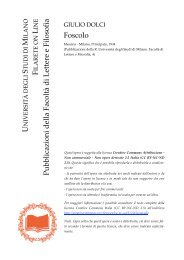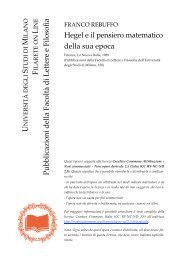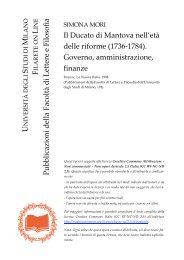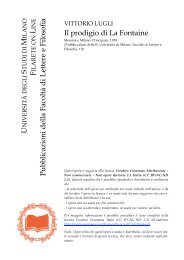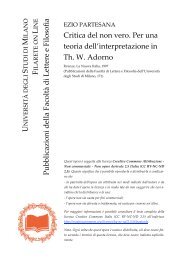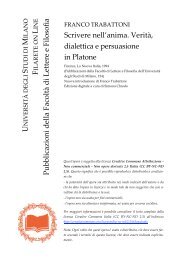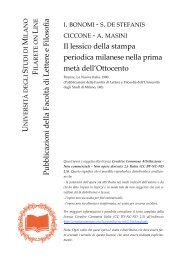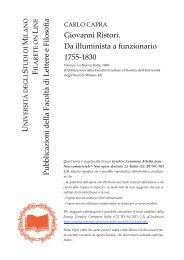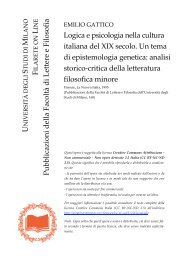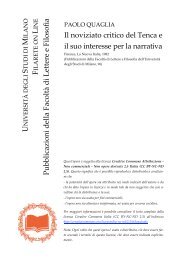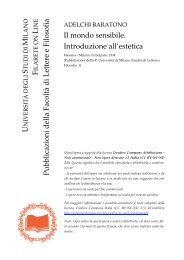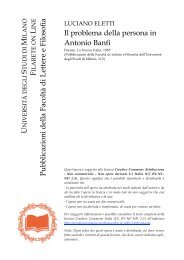Dialoghi sulla religione naturale - Studi umanistici Unimi - Università ...
Dialoghi sulla religione naturale - Studi umanistici Unimi - Università ...
Dialoghi sulla religione naturale - Studi umanistici Unimi - Università ...
Create successful ePaper yourself
Turn your PDF publications into a flip-book with our unique Google optimized e-Paper software.
LA TEOLOGIA DELLA GRAZIA<br />
men » scozzesi poteva avere una « very bad Influence upon Peoples<br />
Morals, and be of dangerous Consequence to their Souls Salvation »,<br />
sottolineò Hadow, ribadendo che alla salvezza erano necessarie « inhe-<br />
rent Holiness and thè Practice of Good Works » 2S . L'eco della pole<br />
mica di Hadow, che si può ritrovare nei Diatogues nel razionalismo e<br />
nel moralismo di Cleante, è avvertibile in quell'intervento di Filone<br />
della parte XII che è uno dei più drammatici dell'intera opera:<br />
We need not run back into antiquity, or wander into remote regions,<br />
to find instances of this clegeneracy. Amongst ourselves, some have<br />
been guilty of that atrociousness, unknown to thè Egyptian and Gre-<br />
cian superstitions, of declaiming, in express terms, against morality,<br />
and representing it as a sure forfeiture of thè divine favour, if thè<br />
Jeast trust or reliance be laid upon it (p. 274).<br />
E qui l'attacco di Filone non si riferisce solo all'Inghilterra, dove il<br />
problema dell'antinomismo apparteneva ormai al '600 e dove era pre<br />
valente da ormai mezzo secolo la dottrina delPadeguazione fra morale<br />
e <strong>religione</strong>, ma anche e soprattutto alla Scozia, dove l'influsso dei « mar-<br />
row men » era ancora vitale alla metà del secolo XVIII, quando Hume<br />
scriveva i Dialogues 29 . Filone sottolinea esplicitamente gli effetti di-<br />
sastrosi della « vulgar superstidon » <strong>sulla</strong> moralità:<br />
But even though superstition or enthusiasm should not put itself in<br />
direct opposition to morality; thè very diverting of thè attention,<br />
thè raising up a new and frivolous species of merit, thè preposterous<br />
distribution which it makes of praise and blame, must have thè most<br />
pernicious consequences, and weaken extremely men's attachment to<br />
thè naturai motives of justice and humanity (p. 274).<br />
The bad effects of such habits, even in common life, are easily ima-<br />
gined: But where thè interests of religion are concerned, no morality<br />
to thè period 1640-1660, London 1951; la cit. è tratta da p. 171. Sulla prima fase<br />
della controversia nel '600 inglese, vedi The antinomian controversy, 1636-1638. A<br />
documentary bistory, ed. with an introduction and notes by D. D. Hall, Middle-<br />
town (Conn.) 1969.<br />
28 J. HADOW, The antinomianism..., cit., pp. 61 e 144.<br />
29 Che il passaggio costituisca in ogni caso un attacco contro il calvinismo è<br />
dimostrato da un brano analogo nella parte XIII della Naturai history of religion,<br />
quando Hume polemizza indirettamente contro il calvinismo citando il Chevalier<br />
Ramsay: « The grosser pagans contented themselves with divinizing lust, incesi,<br />
and adultery; but thè predestinarian doctors have divinized crueity, wrath, fury,<br />
vengeance, and ali thè blackest vices » (Hume on religion, selected and introduced<br />
by R. Wollheim, London and Glasgow 1963, p. 90 n).



